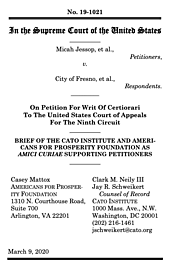Micah Jessop and Brittan Ashjian were the owners of a business that operated numerous ATMs in the Central Valley of California. Given their line of work, the two kept large sums of cash at their business and homes in order to restock their ATMs. At the same time, the plaintiffs owned a dozen “Coin Pusher” machines that operated at various convenience stores in the area. Following a 2010 decision by California’s Bureau of Gambling Control that deemed Coin Pushers “games of chance,” in 2013 the Fresno Police Department executed a warrant at three of the plaintiffs’ properties. During the search, officers seized an exorbitant $151,380 in cash and another $125,000 in rare coins. However, when Jessop and Ashjian approached the city regarding the seizure, it claimed only $50,000 in currency was seized, and denied that any coins were taken. The pair was never charged with committing any crimes.
Jessop and Ashjian brought suit against the City of Fresno and the officers, alleging that the police had effectively used the warrant to steal over $225,000 in cash and rare coins for their own personal enrichment (by seizing over $275,000, but reporting only $50,000). Such blatant abuse of authority would seem to be one of the most obvious examples of the sort of “unreasonable searches and seizures” prohibited by the Fourth Amendment. Yet the Ninth Circuit granted the officers qualified immunity, noting that while “the theft [of] personal property by police officers sworn to uphold the law” may be “morally wrong,” the officers could not be sued for the theft because the Ninth Circuit had never issued a decision specifically involving the question of “whether the theft of property covered by the terms of a search warrant, and seized pursuant to that warrant, violates the Fourth Amendment.”
This case is yet another illustration of the absurdity and injustice of the “clearly established law” standard that characterizes modern qualified immunity doctrine. Under this standard, whether individuals can get relief for constitutional violations by government agents turns not on whether the rights were violated, nor even on whether the defendants were acting in good faith (as these officers obviously were not), but simply on the happenstance of what cases have already been decided in a particular jurisdiction. Worse still, the Ninth Circuit in this case declined even to address the underlying constitutional question, holding only that the law was not clearly established. This means that if police in the Ninth Circuit commit the same sort of flagrant misconduct in the future, they will again be entitled to claim qualified immunity, because the law is still not “clearly established.”
The Cato Institute, joined by the Americans for Prosperity Foundation, has filed an amicus brief urging the Supreme Court to hear Jessop and Ashjian’s case, and to reconsider its misguided qualified immunity jurisprudence. This brief is part of Cato’s ongoing campaign to demonstrate that qualified immunity lacks any legal basis, vitiates the power of individuals to vindicate their constitutional rights, and contributes to a culture of near‐zero accountability for law enforcement, prison personnel, and other public officials.



